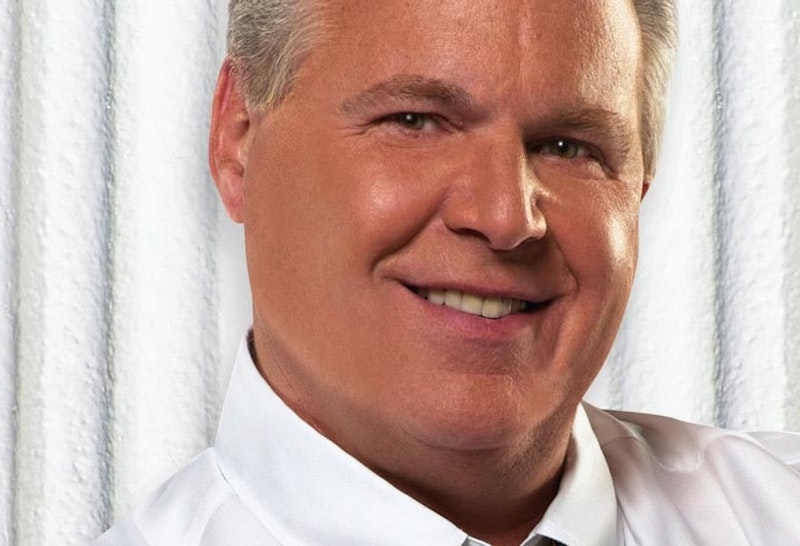Digesting the media salvos over Rush Limbaugh is disconcerting. The debate over whether Limbaugh is the leader of the Republican Party is being waged by the White House, the cable news networks, the print pundits, the online pundits and probably your friends and colleagues. It’s a bit of relief, perhaps, from the dreary onslaught of bad economic news—the plunging stocks, floundering banks and industries—and the ever-clearer realization that the new Administration has an overflowing plate on its hands.
White House Press Secretary Robert Gibbs is enjoying the occasional fire stoking. I find that to be an indulgence of playground politics, not liberal propagandizing as some claim. (With a shit-eating grin, Gibbs called the White House’s involvement in the Limbaugh issue “counter-productive” in yesterday’s briefing.) The White House is having some fun with this, but let’s not forget the whole Republicans-are-in-a-civil-war meme has been rolling down the mountainside since Sen. John McCain veeped Alaska Gov. Sarah Palin at the end of the summer.
And that debate, as I’ve argued at length, is a completely necessary one. But Limbaugh is a symptom, not a cause, and liberals ought to stay on the sidelines of this one. Americans United for Change, a political action committee that made waves in denouncing President Bush’s plan to privatize social security, released an ad recently, titled “Who’s the Republican Party’s Real Leader?”
The ad is (I hope) consciously childish, and it seems to be less about contacting your local congressmen and more to do with stoking division. Overall it’s weak and fairly pointless. One of the rocks of Limbaugh’s foundation is the fact that shots like this resemble rubber arrows in trench warfare. He couldn’t care less.
The ad’s context is Limbaugh’s speech at the recent Conservative Political Action Committee conference in D.C. Rick Moran wrote a piece over at The Next Right comparing, at length, the speeches delivered by Limbaugh and fellow lightening rod Newt Gingrich. He sums up:
Limbaugh, the Iconoclast vs. Gingrich the Conceptualizer. That is where the movement will cleave most noticably [sic]. One side living in the past, fantasizing about recapturing conservative greatness by stroking Reagan's name and accomplishments as if they were a magic talisman designed to wipe away the modern world and lead us back to some ancien regime where everyone bagged their own meat, built their own houses, and churned their own butter. The other, dealing with life in America as it is in the 21st century—an enormously complex clash of interests where conservatism must find a comfortable place in which to compete in the great marketplace of ideas. It will be a lovely little war.
The essay is long but worth the read because it catalogues the pros and cons of both Limbaugh’s populist demagoguery and Gingrich’s wonkish analyses.
It would be wrong to say the two men neatly represent the two halves of the Republican Party or even of conservatism in general; it wouldn’t be wrong, though, to see them as approximate signposts.
David Frum, writing at The New Majority (noticing a theme in the names of these right-leaning websites?), is pissed:
But do the rest of us understand what we are doing to ourselves by accepting [Limbaugh’s] leadership? Rush is to the Republicanism of the 2000s what Jesse Jackson was to the Democratic party in the 1980s. He plays an important role in our coalition, and of course he and his supporters have to be treated with respect. But he cannot be allowed to be the public face of the enterprise—and we have to find ways of assuring the public that he is just one Republican voice among many, and very far from the most important.
Democrats rode President Obama’s coattails into the House and Senate, and the true face of the left is, naturally, the President. There is a fleeting parallel, here: Obama, garnering better and better approval ratings, will take, for the most part, all the credit for economic recovery; as to whether he’ll be blamed for failing, 84 percent of the country “think the current economic conditions were inherited and not caused by President Barack Obama.” Limbaugh, on the other hand, is trying to gather as much momentum behind him as possible so as to elevate himself to the top of the conservative weathervane. If the President does not succeed in either a) demonstrably turning the economy around or b) continuing to remind the public as to where the economy came from, then the White House might pay a hefty price for sticking its nose in the pile of fireworks that is Limbaugh’s populism.

